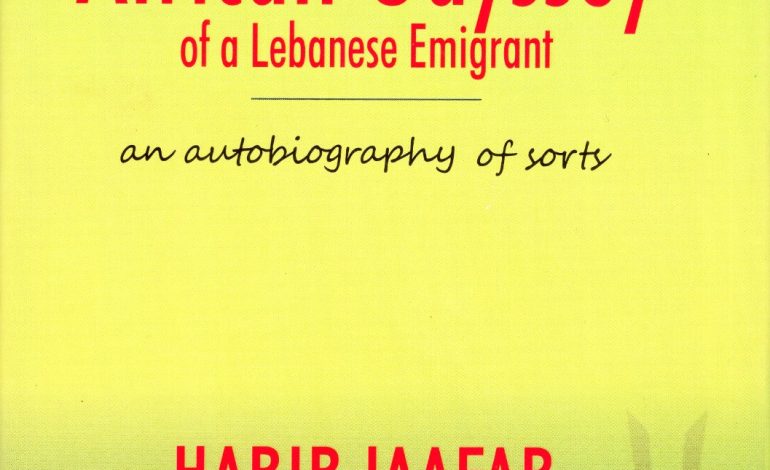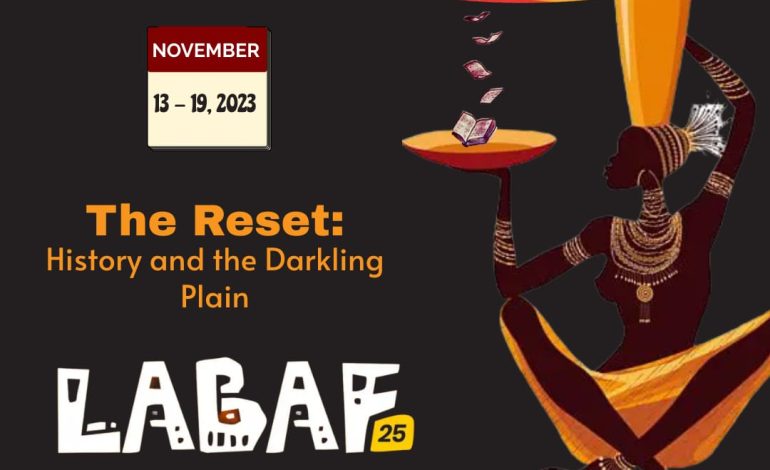In praise of the intrepid life

By Tade Ipadeola
“The fox knows many things, but the hedgehog knows one big thing.”
– Isaiah Berlin
IT is said that all men are equal until one of them writes a book. A book confers the author with an extra quality that is capable of extending life, influence and significance well beyond the normal span of mortal life on earth. It thus stands to reason that all books are equal until the emigrant book arrives. There is a plural quality to the journey described in Habib Jaafar’s new book, African Odyssey of a Lebanese Emigrant, with the quizzical subtitle, An Autobiography of Sorts (Bookcraft, Ibadan; 2023). This book is an oriel into the wonderful, often charmed, sequence of events in the life of the author. The book rides, like a train, on two tracks – one Nigerian and one Lebanese. Sometimes the train stops in America, sometimes in Europe. The narrative gains patina from Persia and from China but it remains rooted in the realities of Nigeria and Lebanon. This is a way of saying that this is that rare Nigerian book that you may have been waiting for. The rare Lebanese book that is steeped in culture without taking its eye off the possibilities in commerce and industry.
African Odyssey is a book of genealogies at one end and a book of visions at the other end. If the fox and the hedgehog ever would agree to write a book together, African Odyssey would be that book. In the spectrum between ancestry and progeny is the intrepid soul of the book. Born and raised in Kano, educated in the Levant and in the New World, the author is the exemplum of education in the oldest, most radical sense of the word. This is different from schooling. The mind that produced this book is not a product of rote learning. African Odyssey is most markedly a product of a mind that has learned to think of times and seasons, of prospects and processes. It is about the counterintuitive bringing forth which is the Latin, etymological, root of educare. And the odyssey described in the book is rich in description of what has been brought about through the author.
Leaving both moorings in the orient and the tropics, the book sojourns in America and in Europe. A reader can follow the journeys across world geography and into the inner life of the author. It is a nurtured mind, open to possibilities wherever they occur, mindful of history, cognizant of the inexorable march of technological progress BUT always concerned with the human quotient in all of its calculus. In an early encounter described in the book, the author, in secondary school in Lebanon, discovers the principle of application of self to tasks in life. Some are born with brilliant minds that makes school work almost a breeze, some are slow in the uptake. Most people are in-between and must learn to apply themselves to their work in an organized manner. The author decided early, that his lot in life was dependent upon how well he applied his time and talents to the opportunities that life will bring his way.

African Odyssey is also a study in friendship. Having learnt the secret of navigating human relationships from his father, Jaafar went on to meet and to become friends with some of the most interesting people in Nigeria and in Lebanon. The author credits his friendship with key figures in Kano, Beirut and Lagos with supplying the propulsive force to birth his dreams for industry and commerce. For the most part, these alliances were varied, useful and even memorable. But there were the occasional, costly, mistaken choices alliances which cost the author and the family business literally millions of dollars in invested funds. Again, as Isaiah Berlin wrote, we are doomed to choose and every choice may entail irreparable loss. Fortunately, the bad friends were few and far between and they are mostly footnotes in an otherwise stellar cast of worthy personalities. The author lists famous journalists, bankers, government officials, diplomats, captains of industry, authors, engineers and artisans in an impressive roll call of who is who that are friends. He has managed to remain himself in the midst of these and to hold his own when it comes to thoughts on what humanity should prioritize.
The accounts in the book come complete with existential moments, some of which are definitive in their life-changing import. Coming within whiskers of death when a car-bomb exploded in Beirut, the author was faced with a life choice of a career in the family business in Lebanon or in Nigeria. He chose to come to Nigeria. The rest, as is often said, is history. The Nigeria which the author left as a child had gone through the boom and bust of the oil boom. There were still echoes of the golden era in Kano where the Hole of Gold hosted the largely Levantine immigrant community. It gave the author a start. It was in Kano that he met with the unforgettable Tayo Aderinokun, banker of bankers and a rare mind. It was also in Kano that he met HRH Sanusi Lamido Sanusi, whose trajectory would include banking, government and the traditional structures.
This book is a book about Lagos. There are, of course, business people who have tentacles in both Lagos and in Kano but very few, if any, have written about the thread that runs through the two bustling cities. Jaafar has done so in a way that makes the people in those two places, separated by a little over a thousand kilometers, come to life. It was in Lagos that the author met with Chief Arthur Mbanefo and a host of business personalities. It was in Lagos that the author reinvented his business models and extended his reach into neighbouring Ogun State. The author offers glimpses of how a serious business person may go about building an enterprise and this makes this book one for discerning business schools.
Finally, and inexorably, this book is about Lebanon and the world. The author came of age at a critical time in the transformation of modern Lebanon and witnessed the troubles that have visited the country. He has drawn many lessons from these and the pragmatic businessman in the author thinks that the world may learn a thing or two from the country that supplied not one but two of the original architects of the United Nations. The liberal spirit that transcend parochial boundaries of religion and sectarianism, found on every page of the book, borrows a leaf from old Lebanon.
Somewhere in Lagos, Ibadan, Kano and Kaduna, tomorrow, Lebanese and Nigerian young and old people will sit to share a meal of bread and hummus with a dash of olive oil from Lebanon, carrying on a tradition that is now at least three generations old. Also, tomorrow, in a schoolroom, a lecture theatre and an auditorium in Beirut, mostly young Nigerians and Lebanese people will sit through a lecture at one of the many learning institutions over there, in what is a fledgling cross-cultural exchange between Nigeria and one of the most ancient cultural locations on planet earth. What these encounters build is a world of possibilities that is richer and capable, of course, correction as time goes by. There will be the mention of Khalil Gibran in one of those encounters and my hope is that there will soon be, too, the mention of Habib Jaafar!



